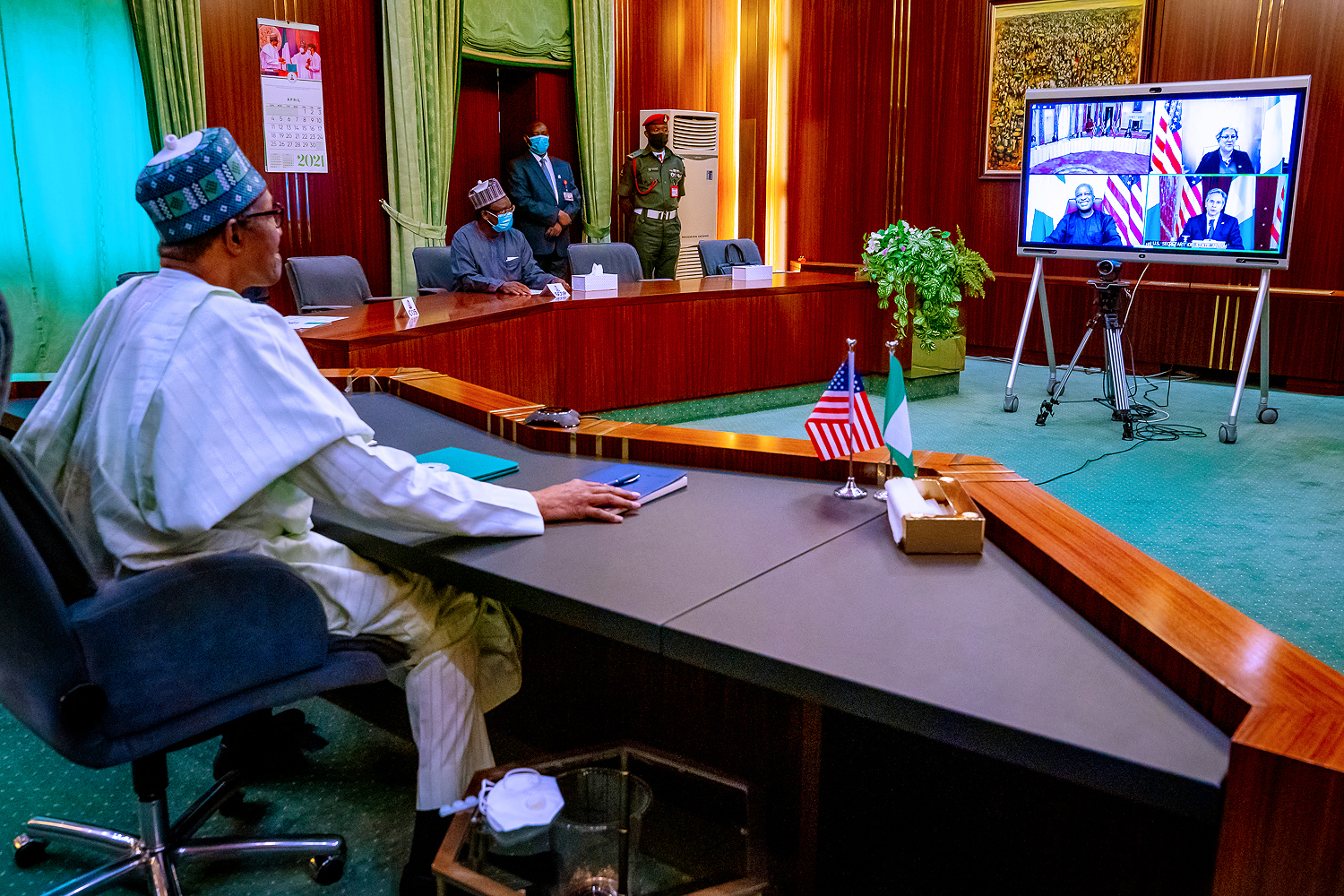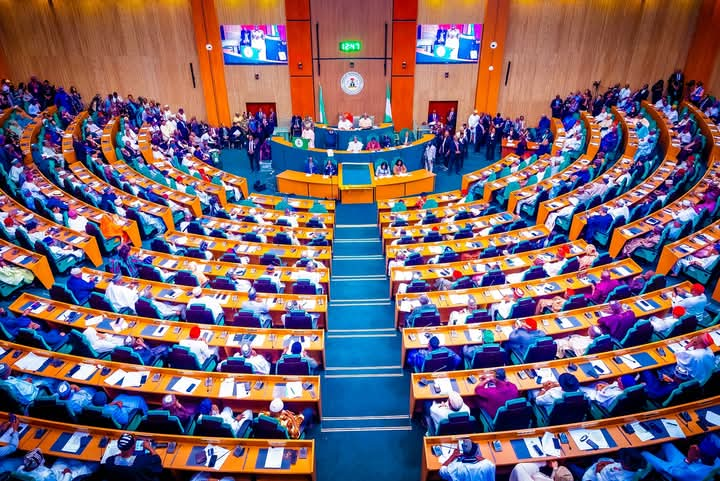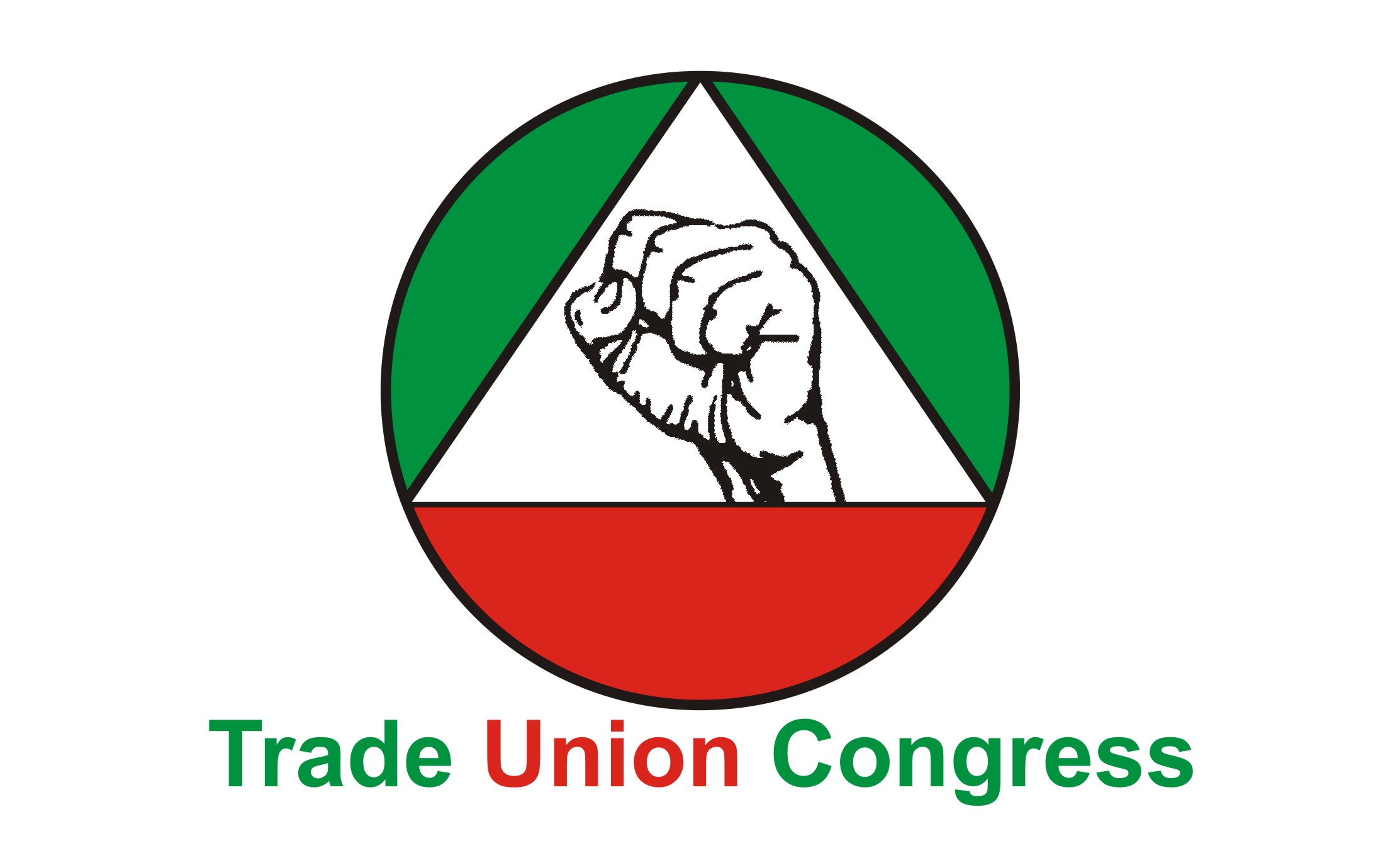Featured
Buhari Seeks US Assistance To End Insecurity

President Muhammadu Buhari yesterday stressed the need for the support of the United States and other “important and strategic partners” in combating the security challenges facing Nigeria.
He said the support was necessary because the consequences of insecurity in Nigeria would affect all nations.
According to a statement by his Special Adviser on Media and Publicity, Femi Adesina, the President made the call during a virtual meeting with the US Secretary of State, Mr Anthony Blinken.
The statement was titled, ‘Security: President Buhari asks US to relocate headquarters of AFRICOM to Africa, warns of likely spill over’.
Recall that Nobel Laureate, Prof Wole Soyinka, had while lamenting the nation’s security situation on Saturday, called on the President to seek help.
Apart from seeking the assistance of the US, according to the Presidency’s statement, Buhari also called on the US to consider relocating US Africa Command from Stuttgart, Germany, to Africa, nearer the Theatre of Operation.
He also admonished the international community to support Nigeria and the sub-region in tackling growing security challenges to avoid spill over.
Buhari said AFRICOM, which partners with countries to counter transnational threats, should be relocated to Africa to strengthen ongoing efforts to check the security situation, with likely effect on other nations.
He said, “The security challenges in Nigeria remain of great concern to us and impacted more negatively, by existing complex negative pressures in the Sahel, Central and West Africa, as well as the Lake Chad Region.”
“Compounded as the situation remains, Nigeria and her security forces remain resolutely committed to containing them and addressing their root causes.
“The support of important and strategic partners like United States cannot be overstated as the consequences of insecurity will affect all nations hence the imperative for concerted cooperation and collaboration of all nations to overcome these challenges.
“In this connection, and considering the growing security challenges in West and Central Africa, Gulf of Guinea, Lake Chad region and the Sahel, weighing heavily on Africa, it underscores the need for the United States to consider re-locating AFRICOM Headquarters from Stuttgart, Germany to Africa and near the Theatre of Operation.”
Buhari said Nigeria would enhance collaborations in all forms, with friends and strategic partners, to work together for greater security for all, which remain the most significant condition for overcoming the existential challenges.
He congratulated Blinken on his appointment by President Joe Biden, and commended US for the decision to repeal the immigration restriction known as the “Muslim ban’’, re-joining the World Health Organisation and Paris Agreement on Climate Change.
He added, “Nigeria attaches great importance to its relations with the United States. Let me in this connection express appreciation to President Joe Biden for his welcome and reaching decision to repeal the Immigration restriction known as the ‘Muslim ban’ on travel and visas for citizens predominantly from Muslim nations and African countries, including Nigeria.
“I also wish to congratulate the United States for re-joining the World Health Organization and Paris Agreement on Climate Change. The leadership of the United States in these two organisations is crucial for international community.
“This action is a demonstration of the United States commitment in championing and supporting international organisations with the aim to build a better world for all.”
Buhari noted that Nigeria remains resolute in her commitment to supporting global efforts as enshrined in the Paris Agreement on Climate Change, which seeks to limit global warming and reduce greenhouse gas emissions.
According to the President, the convening of the Climate Change Summit last week by President Biden was a strong indication of the renewed interest of the United States to the Paris Agreement.
“I would like to extend our goodwill message to President Joe Biden and his Administration. May I also thank you for initiating this meeting, which I am confident, given your background and current position, you will use to promote the existing bilateral relations between our two countries,’’ the President said.
The statement also quoted the Secretary of State as saying that he was pleased to make Nigeria part of his “first virtual visit to Africa,” noting that Nigeria and the US share a lot in bilateral issues.
He added that he would be delighted to build on the foundation that was laid between the two countries over 60 years ago, disclosing that areas of discussion with Nigeria would include “how to build our economies back after the Covid-19 pandemic, security for vulnerable communities, and climate issues.”
In his response, the Secretary of State, Antony J. Blinken, said, that the US will continue the strengthen joint efforts to counter terrorism and insecurity, strengthen health systems, support democratic institutions, bolster economic growth, advance gender equality, and boost bilateral trade between the United States and Nigeria.
On U.S.-Nigeria Relations, he said, “With Africa’s largest population, democracy, and economy, Nigeria is one of our most important partners on the continent.
“The year 2020 served as an historical benchmark, as Nigerians reflected on the opportunities and challenges the country faces while marking its 60th anniversary of independence and bilateral relations with the United States.
“Nigeria is the largest source of immigrants from Africa to the United States, with more than 500,000 Nigerian-born American citizens and legal residents in the U.S”.
On Pandemic Response and Health Diplomacy, Blinken noted that, “The United States and Nigeria have collaborated closely to combat the Covid-19 pandemic. More than 60 interagency members from the U.S. Mission worked side-by-side with Nigerian counterparts on the Presidential Task Force on Covid-19 to plan and respond to the disease.
“The United States has contributed more than $73million in Covid-related equipment and technical assistance. This includes the delivery of a mobile field hospital, 200 ventilators, epidemiological Covid detection surveys, personal protective equipment, provision of rapid response teams, training of over 200,000 military and civilian personnel on Covid-19 control measures, and technology transfer for virtual training.
“Ongoing U.S. health programs reach more than 60 million Nigerians with lifesaving services, including by training public health workers and improving access to quality medicines, vaccines, medical facilities, and reproductive health materials.
“The President’s Emergency Plan for AIDS Relief (PEPFAR) has worked with the Government of Nigeria since 2004 to provide HIV and TB care and treatment services, with a momentum propelling Nigeria toward epidemic control within two years. As of December 2020, more than 1.2 million people receive PEPFAR-supported HIV treatment, and our partners placed 350,000 new patients on lifesaving antiretrovirals despite the Covid-19 pandemic.
“Since 1997, the United States has directly supported polio surveillance and polio campaigns that reached nearly all of Nigeria’s 33 million children under 5 years of age, contributing to Nigeria being certified as wild polio-virus free in 2020.
“Since 2011, the President’s Malaria Initiative has procured more than 60 million insecticide-treated nets, 46 million rapid diagnostic test kits, 87 million treatment courses for malaria, and 20 million doses of malaria prophylaxis during pregnancy, as part of over $690million contributed to malaria control in Nigeria.
“Nigeria is a key U.S. partner in the Global Health Security Agenda (GHSA). The mission approved $3.4million in FY 2020 GHSA funding for capacity building programs to strengthen zoonotic surveillance labs, infection-prevention control, antimicrobial resistance, and risk communication”.
On Bilateral Economic Engagement, the secretary of state, said, “Nigeria is our second largest trading partner in Africa; two-way trade between our nations expanded to over $10billion in 2019. The United States is proud to be one of the largest foreign investors in Nigeria. S. support for economic growth includes funding $8.5million in feasibility studies and technical assistance in 2020-2021, extending loan guarantees worth up to $80million, and coordinating development finance in important sectors such as agriculture, healthcare, renewable energy, and information and communication technology. These activities support bilateral trade and investment ties while building more modern and sustainable infrastructure across Nigeria.
“Through Feed the Future, the United States supports private sector expansion of markets, as well as the introduction of techniques to increase productivity, strengthen resilience, and improve nutrition for more than two million farmers and their communities.
“Since its launch in 2013, Power Africa has mobilized $4.3billion in financing and connected nearly two million households and businesses in Nigeria. Power Africa helps to attract private sector investment and supports the rollout of both on-grid and renewable off-grid electricity connections in order to spur economic growth and reduce poverty”.
Speaking on Educational and Cultural Exchanges, Blinken said, “With over 100,000 travelers to the United States each year, Nigerians boost American businesses, colleges, and universities. There are over 8,800 education and exchange program alumni from Nigeria and the United States.
“Nigeria sends more students to American colleges and universities than any other country in Africa and is the eleventh largest source worldwide of international students to the United States. In Academic Year 2019-2020, a record-breaking number of nearly 14,000 Nigerians pursued U.S. graduate and undergraduate degrees, bringing an estimated $501 million to communities across America. In 2020, advisees of EducationUSA services received scholarships worth $28million.
“The United States provided more than 9 million teacher’s guides and books in five of Nigeria’s most widely spoken languages to advance early grade reading”.
On peace and security, he said, “North-East Nigeria has become one of the world’s most challenging and complex humanitarian crises. The United States is the largest humanitarian donor in response to the crisis, providing $1.45billion since 2015 and supporting almost two million conflict-affected households.
“Since 2017, Department of State and Department of Defense security assistance for Nigeria totals approximately $650million, including $500million in Foreign Military Sales. The United States looks forward to delivering twelve A-29 Super Tucano aircraft this year. “Nigeria also has one of the largest International Military-Education and Training (IMET) programs in Sub-Saharan Africa.
“The United States promotes strong and broad collaboration between government and civil society at all levels, including civil society organizations led by women and members of marginalized groups. We also support the establishment of robust early warning systems to identify and mitigate drivers of communal conflict and violence in vulnerable states.
“We provide technical assistance, and train and equip law enforcement and judiciary professionals to address a wide range of priorities, ranging from stopping banditry to protecting intellectual property rights to more effectively addressing trafficking in persons and gender-based violence. Law enforcement programming focuses on building capacity for civilian security actors, particularly the Nigeria Police Force.
“As the Gulf of Guinea has become the world’s hotspot for piracy and armed robbery at sea, Nigeria has stepped up efforts to stem this problem, including a new initiative, Deep Blue, consisting of vessels, shoreside infrastructure, and personnel that can be dispatched to respond to piracy incidents. It is expected to become operational by mid-2021. U.S. efforts to stem piracy in the Gulf of Guinea help to strengthen maritime governance, enable the development of sustainable, maritime-based economies, and protect international maritime commerce”, Blinken added.
Featured
Reps Propose Creation of 31 New States

The House of Representatives Committee on Constitution Review has proposed the creation of 31 new states in the country.
If the proposal scales through, the Nigerian state will be made up of 67 sub-national governments.
The proposal for new states was contained in a letter read during yesterday’s plenary session by the Deputy Speaker, Benjamin Kalu, who presided over the session in the absence of the Speaker, Mr Tajudeen Abbas.
The committee chaired by Kalu proposed six new states for North Central, four in the North East, five in the North West, five in the South East, four in the South-South and seven in the South West.
The letter read in part, “The committee proposes the creation of 31 new states. As amended, this section outlines specific requirements that must be fulfilled to initiate the process of state creation, which include the following:
New state and boundaries
“An act of the National Assembly for the purpose of creating a new state shall only be passed if it requires support by at least the third majority of members.
“The House of Representatives, the House of Assembly in respect of the area, and the Local Government Council in respect of the area are received by the National Assembly.
“Local government advocates for the creation of additional local government areas are only reminded that Section 8 of the Constitution of the Federal Republic of Nigeria, as amended, applies to this process.
“Specifically, in accordance with Section 8 (3) of the Constitution, the outcome of the votes of the State Houses of Assembly in the referendum must be forwarded to the National Assembly for fulfillment of state demands.
“Proposals shall be resubmitted in strict adherence to the stipulations. Submit three hard copies of the full proposal of the memoranda to the Secretariat of the Committee at Room H331, House of Representatives, White House, National Assembly Complex, and Abuja.
“Sub-copies must also be sent electronically to the Committee’s email address at info.hccr.gov.nj. For further information or contact, please contact the Committee Clerk at 08069-232381.
“The committee remains committed to supporting the implementing efforts that align with the Constitutional provisions and would only consider proposals that comply with the stipulated guidelines. This is coming from the Clerk of the Committee on Constitutional Review.”
The proposed new states are Okun, Okura and Confluence states from Kogi; Benue Ala and Apa states from Benue; FCT State; Amana State from Adamawa; Katagum from Bauchi State; Savannah State from Borno, and Muri State from Taraba.
Others are New Kaduna and Gujarat from Kaduna State; Tiga and Ari from Kano; Kainji from Kebbi State; Etiti and Orashi as the 6th state in the South East; Adada from Enugu, Orlu and Aba from the South East.
Also included are Ogoja from Cross River State; Warri from Delta; Ori and Obolo from Rivers; Torumbe from Ondo; Ibadan from Oyo; Lagoon from Lagos; Ijebu from Ogun State, as well as Oke Ogun/Ijesha from Oyo/Ogun/Osun States.
Featured
TUC Opposes FG’s Proposed Toll Gate On Federal Roads, Rejects Electricity Tariff Hike

The Trade Union Congress of Nigeria, (TUC), yesterday, opposed the plans by the Federal Government to toll selected federal roads in the country, as a means of revenue generation.
The TUC also kicked against any attempt to increase telecom tariff, saying it will compound the present economic hardship Nigerians are going through.
President of TUC, Comrade Festus Osifo, while presiding over the 1st Quarter 2025 National Administrative Council (NAC) of the Union in Abuja, yesterday, condemned the proposed reintroduction of toll gates on some federal highways without first of all ensuring that the roads are in good condition.
Osifo, who blamed the hardship in the country as a result of the government policies like the flotation of the naira, wondered why the Federal Government should initiate policies bothering on the citizens without due consultations with relevant stakeholders.
He said its is annoying that most of the roads which are unpaved, dilapidated, and riddled with potholes should be open for collecting tolls.
A communique issued at the end of the meeting partly read: “NAC deliberated on the proposed introduction of toll gates on selected federal roads and strongly condemned it in its entirely. While we acknowledge that tolling is a globally recognized method of generating revenue for road maintenance, it is unacceptable to impose tolls on roads that are unpaved, dilapidated, and riddled with potholes.
“The NAC views this as an insult to Nigerians, who are being asked to pay tolls on roads that are in total disrepair. Our highways are death traps unsafe, abandoned, and filled with potholes. Rather than fulfilling its responsibility to fix and maintain these roads, the government is resorting to shameless extortion.
“The Congress, therefore, demands that all roads earmarked for tolling must first be fixed, properly tarred, and repaired to international standards before any discussion on tolling can be entertained”.
Although the Federal Government recently debunked plans to increase electricity tariff by 65 percent, TUC said it was alarming that the government even considered the hike in the first instance.
Osifo lamented that the previous increment already inflicted severe hardship on citizens.
He said, “This proposed increase is not only ill-timed but also a deliberate act of economic oppression against Nigerians, who are already struggling under unbearable economic conditions.
“The improved service quality promised during the last tariff hike, particularly for consumers under the so-called “Band A” category, has not been realized. Most consumers, regardless of their tariff band, continue to live in perpetual darkness”.
TUC observed that the root cause of escalating prices and galloping inflation was the devaluation of the Naira.
Going down memory lane, Osifo said in February 2024, the TUC addressed a world press conference, where it clearly stated that the excessive devaluation of the naira was the primary cause of rising inflation and the continuous increase in the prices of goods and services.
He said Congress also warned that this trend would worsen inflation in 2024, impacting virtually every sector of the economy and severely affecting the social and economic well-being of Nigerian workers and the masses if the solutions it canvassed were not adopted.
The TUC President said 12 months later, the Congress position remained unchanged, alleging that the symptoms of the root cause have manifested clearly.
According to him: “These include the skyrocketing prices of essential goods, the escalating costs of social services, the proposed hike in telecom tariffs, the increase in electricity tariffs (with plans for further increments), the rising prices of petroleum products amongst others.
“The TUC remains focused on addressing the root cause of these economic challenges rather than merely reacting to the manifested symptoms. To this end, the TUC demands a better foreign exchange (FX) management regime from the Central Bank of Nigeria (CBN) as the naira is currently undervalued, as confirmed by both local and international experts.”
He warned that if the policies were not reviewed to favour the citizens, the TUC may be compelled to mobilise for mass protest.
“The NAC, on behalf of the Congress, strongly advises the government to refrain from introducing policies that would further exacerbate the current economic hardship faced by hardworking Nigerians.
“If the administration insists on implementing these policies, the TUC will have no choice but to mobilize the working class, civil society, and the oppressed masses for a nationwide action. This level of exploitation is unacceptable. A stitch in time saves nine,” he warned.
Featured
Africa Must Stop Depending On Foreign Blueprints -Tinubu

President Bola Tinubu has charged African leaders to stop clinging to their old habit of depending on foreign plans, saying the continent is in dire need of leaders who wield policy as a surgical blade instead of a slogan.
Tinubu lamented what he described as “the tragedy of our time” whereby African leaders do not only confine themselves to foreign blueprints but refused to emancipate themselves from client-state mentalities and governance by hashtag activism.
The President made these remarks in Abuja, yesterday, during the Dr. Kayode Fayemi commemorative symposium and launch of the Amandla Institute for Policy and Leadership Advancement, with the theme “Renewing the Pan-African Ideal for the Changing Times: The Policy and Leadership Challenges and Opportunities.”
The symposium was organised to commemorate the 60th birthday of the former Governor of Ekiti State, Dr Kayode Fayemi.
Represented at the event by the Vice-President, Senator Kashim Shettima, the President said, “Whatever our differences across the continent, one fact that can’t be eroded by our infighting is that we are in the age of machines, and we can’t fight our development dilemma with spears and arrows while the rest of the world is fighting the same battle with missiles and tanks. The world is not waiting for Africa to catch up.
“While we parse political rivalries, others parse datasets. While we litigate history, others engineer futures. The train of progress accelerates, yet too many of our leaders cling to old carriages. These are our client-state mentalities, our dependency on foreign blueprints, and our governance by hashtag activism. This is the tragedy of our time.
“The founding of Amandla Institute emerges as an antidote to this paralysis. We are here not only to generate more ideas but to create executors. We need leaders who wield policy as a scalpel, not a slogan. We need visionaries who see AI as a collaborator, not a competitor. We need a generation of Africans who recognise that Pan-Africanism, renewed for this age, must be rooted in actionable sovereignty.”
Tinubu pointed out that it would be wishful thinking to hope that the renaissance of Africa will happen as a gift, maintaining that it must be built.
He regretted that for too long, leaders in Africa have outsourced their thinking, relying on institutions and ideologies that treat countries on the continent “as consumers, not creators,” just as he insisted that the youth must be empowered to innovate in tech hubs across the continent.
“But the post-idea world dissolves excuses. With the democratisation of knowledge, we must empower our youth to innovate in tech hubs across the continent, from Cairo, down through Nairobi, to Lagos, building unicorns without the permission of any gatekeepers. What they lack is not ideas but ecosystems—systems where policy, funding, and political will converge to scale their genius,” he noted.
The Nigerian leader further urged African leaders to “evolve from custodians of power to architects of platforms,” adding that their “imagination of Africa must be one where every government ministry houses.
“AI strategists, where continental trade policies are drafted by homegrown think tanks like Amandla Institute, not foreign consultants, and where “Made in Africa” signifies not raw materials but algorithms, green tech, and cultural capital.”
-

 Politics4 days ago
Politics4 days agoProbe My Father With Clean Intent, El-Rufai’s Son Tells Kaduna Govt
-
Maritime3 days ago
NRC, APMT Plan Cargo Movement Expansion From Apapa To Ibadan
-

 Sports4 days ago
Sports4 days agoEdo Inaugurates Committee For Edo Sport Festival
-

 Oil & Energy4 days ago
Oil & Energy4 days agoNCDMB Targets 70% Local Content Policy Implementation By 2027
-
Rivers3 days ago
Don Proposes Group Matrix In Organisational Efficiency
-

 Sports4 days ago
Sports4 days agoChelsea Fall Short Against Brighton
-

 News3 days ago
News3 days agoNigeria, Venezuela Explore Mining Opportunities
-

 Politics4 days ago
Politics4 days agoAhead 2027, Obidient Movement Engages Stakeholders In Borno













